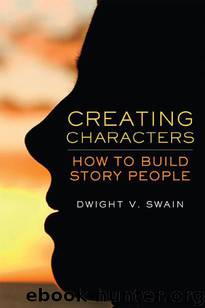Creating Characters: How to Build Story People by Swain Dwight V

Author:Swain, Dwight V. [Swain, Dwight V.]
Language: eng
Format: epub
ISBN: 9780806183855
Publisher: Univ of Oklahoma Pr (Trd)
Published: 2012-11-28T07:00:00+00:00
THE PROTAGONIST
The protagonist in a story is most often termed the hero or heroine. But that can be deceiving. Actually, the protagonist is the character who has a goal, the individual who’s trying to achieve something.
A good case in point is Crossing Delancey, a play by Susan Sandler that later was made into a movie. At first glance it appeared to be a simple love story about a Jewish girl, clerk in a bookstore, who’s moved Uptown from the Lower East Side. An East Side pickle peddler is her would-be suitor.
Who’s the protagonist, girl or suitor?
Surprisingly enough, it’s neither. The central figure, if you check closely, is the girl’s Jewish grandmother, who’s determined to see Girl married to a nice Jewish boy and secure in a traditional home.
Thing is, Girl is happy as she is. Boy isn’t at all certain that Girl is the right bride for him. But Grandmother, unhappy because a change has come into her life—that is, Girl has abandoned her heritage for Uptown—has a goal: She’s going to bring Girl back to her roots. To that end, she sets out to manipulate Girl into a proper marriage and acknowledgment of her Jewish values.
Do you see the pattern? As I’ve noted before, a story is the record of how somebody deals with danger. The protagonist is that somebody—a character made unhappy by a change in his or her situation and thus goal-motivated to a course of action that will return the happiness. Most often, that makes the protagonist what we commonly call the hero, but not always. Goal orientation or purpose is the issue.
Most often, too, the protagonist is the character readers care most about or are most interested in. But again, not always. The grandmother in Crossing Delancey has been so skillfully disguised that at first glance we tend to think of her as incidental, whereas actually she’s the key to the puzzle.
What’s your first step where building a protagonist is concerned, then? It’s to ask yourself the essential question, “Whose story is this?” Because, believe me, it is somebody’s, and that somebody is the person endangered, whether through threat to life, threat to happiness, or threat to dignity. Making the right decision as to who’s threatened, choosing the right person for the role, is vital.
Note, too, that “protagonist” is a neutral term where sex is concerned. The old days when it automatically called forth masculine images is gone. Today, female protagonists often hold center stage.
It’s also highly desirable to keep your protagonist an individual rather than a group. While we may cheer for a ball team, zeroing in on one player who has a private world to win or lose makes for an infinitely stronger effect.
So you have a proper hero or heroine. How do you make the story turn out “right,” come to a proper conclusion?
You set your protagonist up with what I call climax potential. This means the protagonist has two things vitally important to him, not just one—love and security, for example;
Download
This site does not store any files on its server. We only index and link to content provided by other sites. Please contact the content providers to delete copyright contents if any and email us, we'll remove relevant links or contents immediately.
Asking the Right Questions: A Guide to Critical Thinking by M. Neil Browne & Stuart M. Keeley(5757)
Autoboyography by Christina Lauren(5226)
Eat That Frog! by Brian Tracy(4525)
Dialogue by Robert McKee(4386)
Sticky Fingers by Joe Hagan(4188)
Journeys Out of the Body by Robert Monroe(3615)
Annapurna by Maurice Herzog(3464)
Full Circle by Michael Palin(3443)
Schaum's Quick Guide to Writing Great Short Stories by Margaret Lucke(3373)
Elements of Style 2017 by Richard De A'Morelli(3339)
The Art of Dramatic Writing: Its Basis in the Creative Interpretation of Human Motives by Egri Lajos(3058)
Atlas Obscura by Joshua Foer(2952)
Why I Write by George Orwell(2944)
The Diviners by Libba Bray(2927)
The Fight by Norman Mailer(2927)
In Patagonia by Bruce Chatwin(2920)
The Mental Game of Writing: How to Overcome Obstacles, Stay Creative and Productive, and Free Your Mind for Success by James Scott Bell(2897)
Venice by Jan Morris(2568)
The Elements of Style by William Strunk and E. B. White(2470)
